Slow Down Your Life Through the Magic of First Moments
Heather and I were 25 when we got married. We honeymooned in Italy. It was the first time that either one of us had traveled overseas. From the sights and the smells, to the sounds and the textures, I remember almost every moment of the trip in vivid detail. I can still taste the fresh olives, gelato, and seafood. It was a trip full of first moments.
My last trip to Florida, on the other hand, is a bit of a blur. Some memories are clear, but I have a hard time distinguishing last year’s spring break trip from past ones.
On the surface, this seems odd. After all, one trip was 17 years ago, while the other was 10 months ago. So what’s the difference? Why does one experience leave such a lasting impression?
It’s likely due to the same reason that time seems to slow down when you’re young, and speed up as you get older. The novelty of an experience impacts how your brain perceives it.
David Eagleman is a neuroscientist and author who studies how our brains perceive time. In an article in the New Yorker, he explains that our brains process familiar information quickly. But when new information is introduced, it takes our brains longer to organize and synthesize the data, making the experience more memorable and time (appear to) slow down.
“This explains why we think that time speeds up when we grow older,” Eagleman said. It’s why childhood summers seems to go on forever, while old age slips by while we’re dozing. The more familiar the world becomes, the less information your brain writes down, and the more quickly time seems to pass. “Time is this rubbery thing…it stretches out when you really turn your brain resources on, and when you say, ‘Oh, I got this, everything is as expected,’ it shrinks up,” Eagleman said.
Time may fly when you’re having fun, but the memories made from new and exciting experiences are so dense and vivid that they create the perception that time is actually slowing down.
The “Reminiscence Bump”
Numerous studies have been conducted in which older adults have been asked to recall their most vivid memories. Overwhelmingly, these memories relate to experiences that took place from ages 15 to 25. This phenomenon is called the “reminiscence bump.”
This phenomenon is not new. 19th century British poet Robert Southey once wrote:
Live as long as you may, the first twenty years are the longest half of your life. They appear so while they are passing; they seem to have been so when we look back on them; and they take up more room in our memory than all the years that succeed them.
Why are our teens and twenties such defining decades? A 1988 study, which found that 93 percent of vivid life memories relate to unique or first-time events, may hold the key.
When you’re young, everything is new and novel. You’re engaging in “firsts” at a rapid pace: first kiss, first time driving, first day of high school and college, first job, first travel without your parents. The novelty of these “first moments” creates rich memories, and therefore the time periods of high school and college seem like they lasted forever.
Author Joshua Foer, in Moonwalking With Einstein: The Art and Science of Remembering Everything, writes that adolescence and early adulthood is “the period that’s the most varied and exciting; that’s when you’re hitchhiking across the country, going on lots of dates, having interesting encounters and learning about things for the first time.”
“You’re going to remember your trip hiking across Peru,” Foer explained, “more than the year you spent sitting in your office doing the same job you’d been doing for the past five years.”
Indeed, four years during your forties feels like it goes by in a flash. As you get older, it’s easy to get into a rut of routine, and fall into predictable patterns. Get up, get the kids off to school, go to work, get home, eat dinner, get the kids to bed, hit the couch, go to bed. Rinse and repeat. When you look back, there’s very little pattern interruption. There’s nothing to “break the script.” Life becomes a blur; a hamster wheel of repetition. The worst part: While repetitious days drag by, life speeds away.
This begs the question: What’s the best way to break the monotony, slow down the perception of time, and create more meaningful memories?
Create More First Moments
David Eagleman referred to time as “a rubbery thing.” While we can’t stop the passage of time, we can mold our perception of it. We can interrupt the patterns of our lives by introducing more novelty and new experiences into them, and create more memories and meaning as a result.
The best way to accomplish this is to harness the magic of more first moments. There’s no reason that the majority of our first moments need to take place during our teens and twenties. We can engage in firsts at every stage of our lives. First moments come in all sizes – from something as simple as cooking a new recipe for dinner or exploring a new hiking trail, to something more grand such as overseas travel or learning to play a new instrument.
The key is to not look at new, novel experiences as spontaneous occurrences that happen to you, but rather as things that you make happen.
While Heather and I didn’t have a firm handle on what was driving our desire for change a few years ago, which ultimately led us to move to northern Michigan, it’s clear in retrospect that it was the desire for more first moments. It was a recognition that life is short, and it can pass you by if you let it.
Sometimes you need to break the script to appreciate what’s in front of you, to see what’s possible, and to slow life down. {tweet that} This has certainly been true of our experience. From camping with our family in the Upper Peninsula, to backpacking through Pictured Rocks, to creating the Fairy Trails, to launching a new business, the last couple of years have been full of firsts for us. It’s a period that has been fast-paced, but vividly clear. We’ll never forget it.
First moments have the power to change us. After all, life is nothing more than a series of moments, so plan more that matter, both big and small, into your life.
Do something new every day. Look forward to something every day. Life is short, yes, but first moments make it feel much longer.


